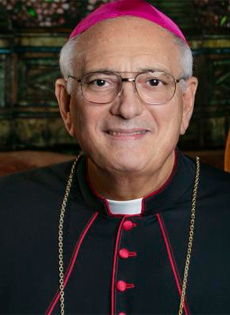
Globalization requires us to change our views on immigration
Monday, December 12, 2022
*Bishop Nicholas DiMarzio
In the age of globalization, when goods and services circulate freely between countries, the concept of labor migration needs to be examined. While we encourage the movement of goods and services, our country has difficulty with the movement of human beings who seek to fill important jobs in our economy.
The recent high number of apprehensions along the U.S.-Mexico border is a case in point. This phenomenon has caused many to believe that we are experiencing an “invasion.”
However, the numbers can be deceiving because the metrics used sometimes do not account for the recidivism of migrants trying to re-enter. In fact, of the over 2 million people taken into custody in fiscal year 2022, 22% were apprehended at least twice.
Moreover, the number of asylum-seekers from authoritarian countries — Venezuela, Cuba, and Nicaragua — increased by 175% this year. Meanwhile, the number of migrants from the Northern Triangle countries of El Salvador, Guatemala, and Honduras decreased by 45%.
The 1.6 million apprehensions that happened during 2021 should also be closely analyzed, as only 40% were Mexicans, changing a long-standing trend.
In an age of globalization, cross-border movements are natural, with points of entrance and departure for the normal flow of goods, services, and workers. Border management has three basic goals: to intercept drugs, to stop undocumented migration and to keep out terrorists and those on a watch list. These goals are more efficiently met at airports, but along the 2,000-mile southern border these goals are nearly impossible to meet.
What is the solution to this problem? As long as opponents stoke the public's fear of uncontrolled migration, legal reform will be politically difficult to achieve.
However, a reformed system that favors legal pathways for family unification and to meet workforce needs will help reduce the number of migrants who cross into the U.S. without authorization. By creating more legal pathways for entry, we will be able to meet our future demand for labor in a safe and orderly manner.
The labor needs of globalization make border control more difficult. Eliminating both human trafficking and smuggling requires new forms of international cooperation. Regional structures can help limit unauthorized migration for those fleeing violence and extreme poverty while also providing them protection.
The proposed solutions will depend on international cooperation and increased resources to assist in giving prompt asylum hearings and attention to other humanitarian protection needs. This may be accomplished by having orientation safe havens close to the exit points of people’s home countries that would allow for them to apply for asylum and avoid making dangerous journeys.
Catholic social teaching reminds us that sovereign nations have a right to protect their borders and admit those in conformity with their laws. But this must be balanced by the common good of those seeking entrance and the needs of a country.
When we look at refugee and asylum situations around the world — such as the admittance of more than 2.5 million refugees by Poland from Ukraine — we realize that our country can afford to be much more generous. We also need to increase the legal pathways for workers and for family reunification.
Globalization requires a new U.S. immigration system that only immigration reform can provide.
This blog also was published as a column in the November 2022 edition of La Voz Católica.


Comments from readers